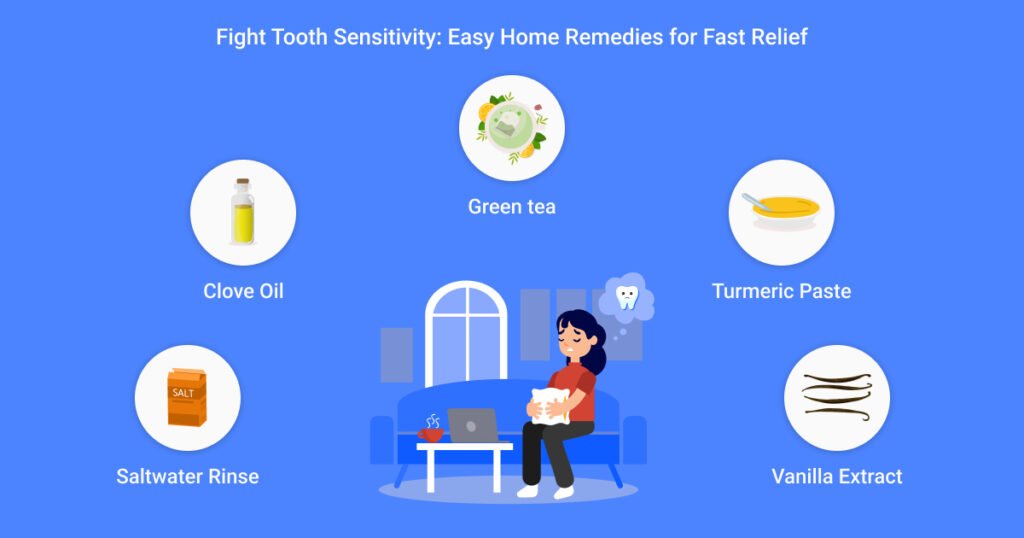Isn’t there a moment of unexpected pain that you sometimes feel so badly in the morning that you can’t enjoy your cup of coffee or strawberry ice cream?
This is probably why you experience sensitivity in your teeth. This problem is present among many people, but luckily, there are techniques that will help you come back to your favorite foods and beverages without pain.
This article, however, will explain the reasons for tooth pain, the methods of self-care, immediate relief that you can apply to the problem, and the solutions that will save you from being distracted by the annoying sensitivity on a daily basis.
Let’s dig deeper into teeth sensitivity and the reasons behind different this.
What Causes Sensitive Teeth?
Understanding the Root of the Problem
Teeth will be sensitive due to the exposure of the dentin (the layer that is just beneath the exterior of your teeth). Dentin is the highly sensitive tissue in the mouth, that could be the most excruciating area to get a cavity as a result of it. Thus the contact of hot, cold, sweet or sour special foods provokes a stunning pain.
Then the question is what breaks this protective wall and opens up the dentin? Here are the two primary reasons for sensitive teeth:
- Enamel Erosion: The enamel coating, which is the outer hard shielding of the tooth, shields and protects the dentin layer, which is softer and more vulnerable to external irritations. The acidic reaction of these and abrasive scrubbing gradually wear the tooth enamel, which exposes the dentin and causes discomfort in the teeth.
- Gum Recession: The gums are the base of your teeth structure. They recede or shrink back and in the process expose the roots of your teeth. These exposed roots are sensitive to hot, cold, and other triggers.
When a twinge of sensitivity strikes, here are some quick solutions you can try for immediate relief.
Immediate Relief: What To Do Right Now
When sensitive teeth pain hits, you want fast relief. Here are a few effective strategies you can try right away:
- Desensitizing Toothpaste: Change to sensitive toothpaste which is specially designed for it. Take time to examine those composed of substances like potassium nitrate that function as a pain reliever because it blocks the signals headed from the tooth’s surface to the nerve.
- Avoid Triggers: Recover with a mild diet for a while, resisting strong drinks and foods. Eat or drink something neutral such as rice, chicken, or boiled water instead of hot or cold beverages, and skip sour foods that include citrus, tomatoes, sweet desserts, and so on.
- Soft Brushing: Circularly brush your teeth with a soft-bristled toothbrush for 2-3 minutes 2 times a day. Don’t apply too much pressure, just feel the toothbrush, no need to wash back and forth with too much force, this is harmful to enamel.
Beyond these, several natural home remedies can offer soothing comfort for sensitive teeth.
Natural Home Remedies
Along with quick fixes, several natural remedies can soothe sensitive teeth and offer relief. Here are a few teeth sensitivity home remedies to try:

1. Saltwater Rinse
First, add one teaspoon of normal salt to a glass of warm water. Gradually move it in your mouth for about 20 to 30 seconds after which you spit it out. Among them, the salt water solution which has an antimicrobial effect is the absolute pain reliever.
2. Clove Oil
Clove oil has eugenol which is a natural anesthetic, which can be used as a medicine for sensitive teeth. Put a drop or two of diluted clove oil (combined with coconut oil) on a cotton ball then apply on the toothache side. Be careful not to use it too much in order to avoid results such as gum redness and irritation.
3. Brush Teeth with Green Tea Infused Mouthwash
Green tea ingredients carry a high amount of antioxidants and anti-inflammatories. Once you are done eating, swill the green tea without sugar to ease your sensitive teeth.
4. Turmeric Paste
Mix the paste with a little turmeric powder diluted in a few drops of water. Use it in the sensitive area, sitting for a few minutes approximately, then wash it off. As turmeric inhibits inflammation in the body, it is an effective way of reducing severe tooth pain.
5. Vanilla Extract
Use pure vanilla extract for this. As an easy way to relieve the pain, place a few drops on the end of the cotton ball and gently rub the back of the throat. Among other things, vanilla has a numbing property, and the pleasant odor may help to deflect you from suffering.
Although home remedies give short-term relief, let us discover the changes in lifestyles with which the sensitivity might not happen again.
Lifestyle Changes for Long-Term Prevention
Even though home remedies relieve temporary pain, changing some simple habits will keep your teeth healthy and prevent the development of future issues.
- Good Oral Hygiene: The proper way of brushing your teeth is to do it twice a day with a fluoride toothpaste, and once a day you floss to eliminate tooth decay and prevent plaque accumulation.
- Dietary Changes: Keep your intake of acidic foods and drinks to a minimum since they can result in enamel erosion. The foods that contain citrus fruits, sodas, and sports drinks are in the list. It shall be advisable that the food be washed in water before the ingestion.
- Mouthguard: Make sure that your dentist knows that you are a tooth grinder and this situation can be improved by wearing special mouthguards at night. This guards your teeth against stress, which can cause discomfort.
- Dental Checkups: Paying regular visits to the dentist will help a lot in the early detection and treatment of gum/tooth problems, thus preventing their worsening and possible increase of pain experienced by a patient.
If the home treatments also do not work in the long run, then you should go to the dentist.
When Should I See a Dentist?
Whilst home treatments may be useful, only a dentist can give definitive and long-term sensitive teeth pain treatment. If you encounter any of the following, make an appointment with your dentist:
- Persistent Pain: When sensitivity remains for more than a week after applying home treatment, see a doctor.
- Severe Sensitivity: If you feel weakness in your daily activities such as eating and drinking because of toothache, consult a professional dentist.
- Possible Underlying Issues: Pain in teeth can be a sign of the following dental diseases like tooth decay, fissures in teeth, and exposed root surfaces that require attention from a dentist.
Professional Treatments
Depending on the cause of your sensitivity, your dentist might recommend the best teeth sensitivity solutions:
- Desensitizing Agents: Stronger versions are available in the office.
- Fluoride Treatments: To strengthen enamel.
- Bonding or Sealants: To cover exposed root surfaces.
- Gum Graft Surgery: For severe gum recession.
- Root Canal: If sensitivity stems from extensive decay or nerve damage.
Home cures are an excellent place to start, but a professional dentist may provide more advanced treatments for total relief.
Conclusion
You don’t have to live with sensitive teeth, which might cause irritation. Immediate home treatments can provide temporary pain relief, but proper dental hygiene habits can help protect your teeth from sensitivity.
However, if you are suffering regular or severe discomfort, do not waste any time and consult your doctor right once. With the appropriate strategies, you may overcome sensitivity and enjoy your favorite dishes without pain.





